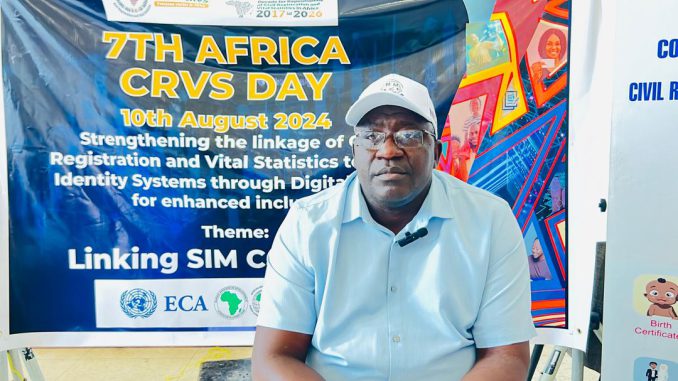
Africa Civil Registration and Vital Statistics Day, which is celebrated annually, marks a pivotal moment for reflection, collaboration and action towards strengthening Civil Registration and Vital Statistics Systems across Africa, especially as the continent strives to accelerate progress in meeting the commitments made under the 2030 Agenda for Sustainable Development to achieving Legal Identity for All.
As a country, we have made significant progress in achieving CRVS targets set by the United Nations beginning with a unique situation where the three components of Civil Registration, Vital Statistics and Identity Management have by law been integrated into a single system, thereby generating the NIN that uniquely identify individuals linking it to access services including sourcing Voter Registration data from the Civil Registration System for the conduct of public elections and referenda.
The theme for this year, “Strengthening the linkage of Civil Registration and Vital Statistics to legal identity systems through digitalization for enhanced inclusion”, serves as a rallying call that emphasizes the pivotal role of digital integration in harmonizing Civil Registration and Vital Statistics Systems with legal identity structures. Such harmonization is essential for promoting effective governance and national development, protecting individual rights, ensuring efficient service delivery, reducing fraud and facilitating cross-border recognition. It forms the backbone of a transparent, accountable and inclusive governance framework that benefits individuals, communities and societies.
- Serving as the National Hub for identity data on the population: The NCRA has more than 90% of the Population digitally registered comprising citizens and other residents in the country. This enables the NCRA to provide accurate population data to other MDAs and Agencies requiring identity verification and authentication to provide services both in the public and private sector.2
- Supporting E-Governance: the linkage of citizens’ identity data with other data systems in Government allows for effective service delivery and proper planning for resource allocation. Linked systems provide valuable data for evidence-based policy making, development planning and monitoring progress towards national and international development goals. Governments, Development Partners and Researchers can use linked data to analyse trends, identify disparities and target interventions more effectively, which will lead to more sustainable development outcomes.
- Identity as a human right: the provision of identity documents such as Birth Certificates, Death Certificates, Marriage Certificates, Adoption Certificates, etc. enables individuals to enjoy their human rights. Legal identity is a fundamental human right and is crucial to gain access to other rights and services. Linking Civil Registration and Vital Statistics and legal identity systems ensures that individuals have official recognition and documentation of their identities, which will enable them to exercise their rights, gain access to social services, participate in economic activities and assert legal claims.
- Supporting Government institutions fight corruption and Identity Manipulation: the NCRA has since 2018 been collaborating with the Accountant General’s Department in the Ministry of Finance to identity rightful wage earners in the Public/Civil Service following the cleaning of the payroll of Ghost Workers and other malpractices. Payroll integrity has been restored and has further helped Government with resources saved from the initiative to meet other obligations as well as enhanced efficiency and productivity in the Civil/ Public Service. The NCRA also works with CID, Interpol and other crime fighting Agencies to identify Fraudsters, criminals and others posing national security threats. This is because Integrated systems that have strong verification mechanisms help to reduce identity fraud, impersonation and other forms of identity-related crime.
- Cross-border recognition: The linkage of Civil Registration and Vital Statistics to legal identity systems facilitates cross-border recognition and documentation of identity. This is particularly beneficial for Migrants, Refugees and individuals moving between countries, as it enables them to gain access to services, establish legal status and participate more fully in their host communities.
The NCRA hopes that this 7th Commemoration of Africa Civil Registration and Vital Statistics Day will ignite conversations on the importance of harmonizing Civil Registration and Vital Statistics with legal identity systems. As the celebration unfolds, national stakeholders are invited to:
- Reflect on the status of National Civil Registration and Vital Statistics and Legal Identity systems in relation to the theme of the celebration, and, where needed, begin to foster dialogue on how such linkage can be established in a systematic and sustainable manner.
- Share success stories, innovative solutions and collaborative initiatives that are driving advancements in Civil Registration and Vital Statistics.
- Cultivate partnerships and synergies among stakeholders to accelerate progress in Civil Registration and Vital Statistics and legal identity initiatives.
Let me on behalf of Government of Sierra Leone Leone, express our sincere thanks and appreciation our CRVS Development Partners that include but not limited to the European Union, Irish Embassy, UNDP, UNICEF, UNFPA, WHO, UNECA, Centre of Excellence for CRVS among others for their incessant collaboration towards the advancement of CRVS and Legal Identify for All that assures no one is left behind
In conclusion, let me reiterate the need to interoperate databases across sectors to enable seamless linkages between data Users and the population data managed by the NCRA. Secondly, this is an opportunity to continue to encourage all those who have not registered with the CVRS and Identity System to do so immediately, to aid their inclusion in social, political, economic development.
I thank you for your attention.
Leave a Reply